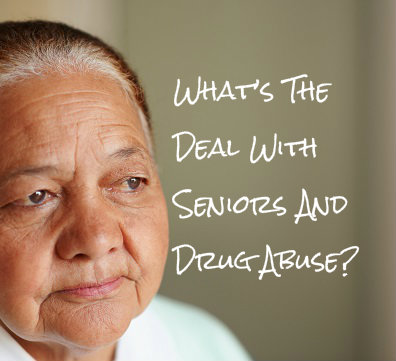What’s The Deal With Seniors And Drug Abuse?
Thinking about drug abuse, you probably picture younger people popping pills, shooting up or smoking. What is difficult is to imagine is that there is a rising problem among older adults when it comes to drug abuse. The main culprits are prescription medications. Just because a doctor prescribes them does not mean these drugs are always safe. Many prescriptions are susceptible to abuse and it is not only younger people who have used them inappropriately. In fact, surveys show that abuse among older Americans is on the rise. If you care for an older family member be aware of the issue so you can intervene if necessary.
What Are The Dangers For Seniors Abusing Prescriptions?
 There are several prescription medications that people abuse because of the feelings they impart. For many, the abuse starts slowly and seems harmless. Just how dangerous are these medications when taken against a doctor’s direction? It depends on the medication, but with any drug the side effects will be amplified and intensified when more than the recommended dose is taken.
There are several prescription medications that people abuse because of the feelings they impart. For many, the abuse starts slowly and seems harmless. Just how dangerous are these medications when taken against a doctor’s direction? It depends on the medication, but with any drug the side effects will be amplified and intensified when more than the recommended dose is taken.
For seniors there are particular risks associated with abusing medications. Your older loved one is likely taking several medications. When she abuses one or more of them she increases the risk of a dangerous interaction between two or more medications. She may also have more health problems that could be exacerbated by taking too much of one medication. Of course, at any age there is the very real possibility that drug abuse could lead to addiction.
Which Prescriptions Are Addictive?
Any medication that has addictive potential can be abused. These drugs all give the user a pleasant feeling, which is why they can lead to dependence. Be aware of the medications your loved one is using and educate yourself as to their risks and addictive potential. There are three main classes of drugs that are most often abused: depressants, stimulants and opioids.
Depressants, also known as sedatives, have a relaxing effect on the body. For seniors, the most likely type of depressant to be prescribed is a sleep aid. Stimulants have the opposite effect. They cause wakefulness and alertness and are most commonly prescribed as ADHD medications. Your older friend is unlikely to be prescribed a stimulant. Of greatest concern may be the opioids. These are painkillers that also produce a high when taken in larger doses. Codeine, morphine, oxycodone, hydrocodone, fentanyl and hydromorphone are examples of prescribed opioids.
What Are The Signs Of Abuse?
If you have an older adult in your care, or are concerned about a parent or friend who takes prescription medications, watch out for signs of drug abuse. Look for signs of intoxication. For example, if she slurs her speech, stumbles or falls more often, or if her behavior in general seems off to you, she may be under the influence.
Also look for other signs that may be subtler, such as changes in behavior or routine. She may experience a change in sleeping habits or appetite as a result of abusing medications. You may also observe increasing irritability or confusion. She may act suspiciously as well. For instance, she might make multiple appointments with different doctors in order to get more prescriptions or start going to different pharmacies to avoid suspicion.
Some of these signs of drug abuse may also indicate a new or worsening health problem. In either instance, you should be concerned for the senior in your care. Start a conversation with her and encourage her to see her doctor to discuss options for dealing with the issue.
Read More About Seniors And The Surge In Substance Abuse – And Help Your Loved One Today!



